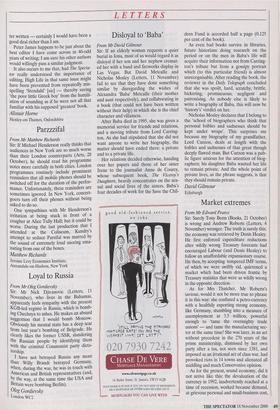Disloyal to 'Baba'
From Mr David Gilmour Sir: If an elderly woman requests a quiet burial in Iona, most of us would regard it as disloyal if her son and her nephew cremat- ed her with a band and fireworks display in Las Vegas. But David Metcalfe and Nicholas Mosley (Letters, 11 November) fail to see that they have done something similar by disregarding the wishes of Alexandra 'Baba' Metcalfe (their mother and aunt respectively), and collaborating in a book (that could not have been written without their help) in which she is the chief character and villainess.
After Baba died in 1995, she was given a memorial service for friends and relations, and a moving tribute from Lord Carring- ton. As she had stipulated that she did not want anyone to write her biography, the matter should have ended there: a private end to a private life.
Her relations decided otherwise, handing over her papers and those of her sister Irene to the journalist Anne de Courcy, whose subsequent book, The Viceroy's Daughters, heavily concentrates on the sex- ual and social lives of the sisters. Baba's four decades of work for the Save the Chil- dren Fund is accorded half a page (0.125 per cent of the book).
As even bad books survive in libraries, future historians doing research on the period or on the men in Baba's life will acquire their information not from Carring- ton's tribute but from a gossipy portrait which (to this particular friend) is almost unrecognisable. After reading the book, the reviewer in the Daily Telegraph concluded that she was spoilt, hard, scratchy, brittle, bickering, promiscuous, negligent and patronising. As nobody else is likely to write a biography of Baba, this will now be `history's' verdict on her.
Nicholas Mosley declares that I belong to the 'school of biographers who think that personal foibles and sadnesses should be kept under wraps'. This surprises me because my biography of my grandfather, Lord Curzon, deals at length with the foibles and sadnesses of that great though deeply flawed man. But Curzon was a pub- lic figure anxious for the attention of biog- raphers; his daughter Baba wanted her life to remain private. And the whole point of private lives, as the phrase suggests, is that they should remain private.
David Gilmour
Edinburgh


































































































 Previous page
Previous page